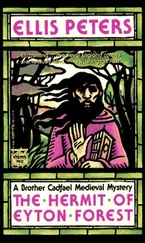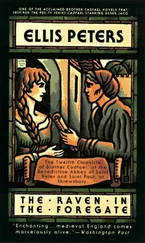Ellis Peters - The Sanctuary Sparrow
Здесь есть возможность читать онлайн «Ellis Peters - The Sanctuary Sparrow» весь текст электронной книги совершенно бесплатно (целиком полную версию без сокращений). В некоторых случаях можно слушать аудио, скачать через торрент в формате fb2 и присутствует краткое содержание. Жанр: Старинная литература, на английском языке. Описание произведения, (предисловие) а так же отзывы посетителей доступны на портале библиотеки ЛибКат.
- Название:The Sanctuary Sparrow
- Автор:
- Жанр:
- Год:неизвестен
- ISBN:нет данных
- Рейтинг книги:5 / 5. Голосов: 1
-
Избранное:Добавить в избранное
- Отзывы:
-
Ваша оценка:
- 100
- 1
- 2
- 3
- 4
- 5
The Sanctuary Sparrow: краткое содержание, описание и аннотация
Предлагаем к чтению аннотацию, описание, краткое содержание или предисловие (зависит от того, что написал сам автор книги «The Sanctuary Sparrow»). Если вы не нашли необходимую информацию о книге — напишите в комментариях, мы постараемся отыскать её.
The Sanctuary Sparrow — читать онлайн бесплатно полную книгу (весь текст) целиком
Ниже представлен текст книги, разбитый по страницам. Система сохранения места последней прочитанной страницы, позволяет с удобством читать онлайн бесплатно книгу «The Sanctuary Sparrow», без необходимости каждый раз заново искать на чём Вы остановились. Поставьте закладку, и сможете в любой момент перейти на страницу, на которой закончили чтение.
Интервал:
Закладка:
He took it and played a long line of melody. “That—what you have heard—that is written down here. Listen again!” And again he plucked it jubilantly forth. “There, now sing me that!”
Liliwin flung up his head and paid him back the phrase.
“Now, follow me still… answer as I go.”
It was an intoxication, line after line of music to copy and toss back. Within minutes Liliwin had begun to embellish, to vary, to return a higher echo that chorded with the original.
“I could make of you a singer,” said Brother Anselm, sitting back in high content.
“I am a singer,” said Liliwin. He had never before understood fully how proud he was of being able to say so.
“I do believe it. Your music and mine go different ways, but both of them are made up of these same small signs here, and the sounds they stand for. If you stay a little, I shall teach you how to read them,” promised Anselm, pleased with his pupil. “Now, take this, practise some song of your own with it, and then sing it to me.”
Liliwin reviewed his songs, and was somewhat abashed to discover how many of them must be suppressed here as lewd and offensive. But not all were so. He had a favourite, concerned with the first revelation of young love, and recalling it now, he recalled Rannilt, as poor as himself, as unconsidered, in her smoky kitchen and coarse gown, with her cloud of black hair and pale, oval face lit by radiant eyes. He fingered out the tune, feeling his way, his left hand now deft and certain on the bellows. He played and sang it, and grew so intent upon the singing that he scarcely noticed how busily Brother Anselm was penning signs upon his parchment.
“Will you believe,” said Anselm, delightedly proffering the leaf, “that what you have just sung to me is written down here? Ah, not the words, but the air. This I will explain to you hereafter, you shall learn both how to inscribe and how to decypher. That’s a very pleasant tune you have there. It could be used for the ground of a Mass. Well, now, that’s enough for now, I must go and prepare for Vespers. Let be until tomorrow.”
Liliwin set the organetto tenderly back on its shelf, and went out, dazed, into the early evening. A limpid, pale-blue day was drifting away into a deeper blue twilight. He felt drained and gentle and fulfilled, like the day itself, silently and hopefully alive. He thought of his battered wooden juggling rings and balls, tucked away under his folded brychans in the church porch. They represented another of his skills, which, if not practised, would rust and be damaged. He was so far buoyed up by his day that he went to fetch them, and carried them away hopefully into the garden, which opened out level below level to the pease-fields that ran down to the Meole brook. There was no one there at this hour, work was over for the day. He untied the cloth, took out the six wooden balls and the rings after them, and began to spin them from hand to hand, testing his wrists and the quickness of his eye.
He was still stiff from bruises and fumbled at first, but after a while the old ease began to return to him, and his pleasure in accomplishment. This might be a very humble skill, but it was still an achievement, and his, and he cherished it. Encouraged, he put the balls and rings away, and began to try out the suppleness of his thin, wiry body, twisting himself into grotesque knots. That cost him some pain from muscles trampled and beaten, but he persisted, determined not to give up. Finally he turned cartwheels all along the headland across the top of the pease-fields, coiled himself into a ring and rolled down the slope to the banks of the brook, and made his way up again, the slope being gentle enough, in a series of somersaults.
Arrived again at the level where the vegetable gardens and the enclosed herbarium began, he uncurled himself, flushed and pleased, to find himself gazing up at a couple of yards distance into the scandalised countenance of a sour-faced brother almost as meagre as himself. He stared, abashed, into eyes rounded and ferocious with outrage.
“Is this how you reverence this holy enclave?” demanded Brother Jerome, genuinely incensed. “Is such foolery and lightmindedness fit for our abbey? And have you, fellow, so little gratitude for the shelter afforded you here? You do not deserve sanctuary, if you value it so lightly. How dared you so affront God’s enclosure?”
Liliwin shrank and stammered, out of breath and abased to the ground. “I meant no offence. I am grateful, I do hold the abbey in reverence. I only wanted to see if I could still master my craft. It is my living, I must practise it! Pardon if I’ve done wrong!” He was easily intimidated, here where he was in debt, and in doubt how to comport himself in a strange world. All his brief gaiety, all the pleasure of the music, ebbed out of him. He got to his feet almost clumsily, who had been so lissome only moments ago, and stood trembling, shoulders bowed and eyes lowered.
Brother Jerome, who seldom had business in the gardens, being the prior’s clerk and having no taste for manual labour, had heard from the great court the small sound, strange in these precincts, of wooden balls clicking together in mid-air, and had come to investigate in relative innocence. But once in view of the performance, and himself screened by bushes fringing Brother Cadfael’s herb-garden, he had not called a halt at once and warned the offender of his offence, but remained in hiding, storing up a cumulative fund of indignation until the culprit uncoiled at his feet. It may be that a degree of guilt on his own part rendered more extreme the reproaches he loosed upon the tumbler.
“Your living ,” he said mercilessly, “ought to engage you rather in prayers and self-searchings than in these follies. A man who has such charges hanging over him as you have must concern himself first with his soul’s welfare, for whether he has a living to make hereafter or none, he has a soul to save when his debt in this world is paid. Think on that, and go put your trumpery away, as long as you are sheltered here. It is not fitting! It is blasphemy! Have you not enough already unpaid on your account?”
Liliwin felt the terror of the outer world close in on him: it could not be long evaded. As some within here wore hovering haloes, so he wore a noose, invisible but ever-present.
“I meant no harm,” he whispered hopelessly and turned, half-blind with misery, to grope for his poor bundle of toys and blunder hastily away.
“Tumbling and juggling, there in our gardens,” Jerome reported, still burning with offence, “like a vagabond player at a fair. How can it be excused? Sanctuary is lawful for those who come in proper deference, but this… I reproved him, of course. I told him he should be thinking rather of his eternal part, having so mortal a charge against him. ‘My living,’ he says! And he with a life owing!”
Prior Robert looked down his patrician nose, and maintained the fastidious and grieved calm of his noble countenance. “Father Abbot is right to observe the sanctity of sanctuary, it may not be discarded. We are not to blame, and need not be concerned, for the guilt or innocence of those who lay claim to it. But we are, indeed, concerned for the good order and good name of our house, and I grant you this present guest is little honour to us. I should be happier if he took himself off and submitted himself to the law, that is true. But unless he does so, we must bear with him. To reprove where he offends is not only our due, but our duty. To use any effort to influence or eject him is far beyond either. Unless he leaves of his own will,” said Prior Robert, “both you and I, Brother Jerome, must succour, shelter and pray for him.”
How sincerely, how resolutely. But how reluctantly!
Читать дальшеИнтервал:
Закладка:
Похожие книги на «The Sanctuary Sparrow»
Представляем Вашему вниманию похожие книги на «The Sanctuary Sparrow» списком для выбора. Мы отобрали схожую по названию и смыслу литературу в надежде предоставить читателям больше вариантов отыскать новые, интересные, ещё непрочитанные произведения.
Обсуждение, отзывы о книге «The Sanctuary Sparrow» и просто собственные мнения читателей. Оставьте ваши комментарии, напишите, что Вы думаете о произведении, его смысле или главных героях. Укажите что конкретно понравилось, а что нет, и почему Вы так считаете.












